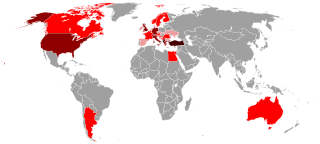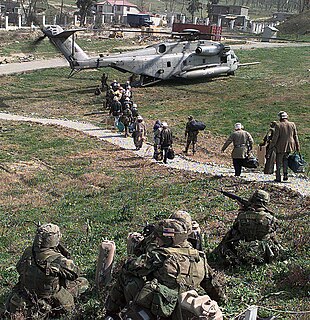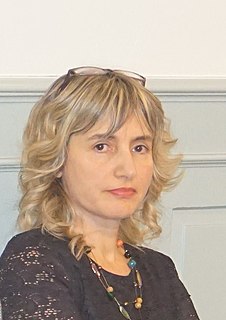
Albania, officially the Republic of Albania, is a country in Southeastern Europe. It is located on the Adriatic and Ionian Seas within the Mediterranean Sea and shares land borders with Montenegro to the northwest, Kosovo to the northeast, North Macedonia to the east and Greece to the south. Tirana is its capital and largest city, followed by Durrës, Vlorë, and Shkodër.

The Albanians are an ethnic group native to the Balkan Peninsula who share a common Albanian ancestry, culture, history and language. They primarily live in Albania, Kosovo, North Macedonia, Montenegro, Serbia as well as in Croatia, Greece, Italy and Turkey. They also constitute a large diaspora with several communities established across Europe, the Americas and Oceania. Diaspora based Albanians may self identify as Albanian, use hybrid identification or identify with their nationality, often creating an obstacle in establishing a total figure of the population.

Korçë is the eighth most populous city of the Republic of Albania and the seat of Korçë County and Korçë Municipality. The total population is 75,994, in a total area of 806 km2 (311 sq mi). It stands on a plateau some 850 m (2,789 ft) above sea level, surrounded by the Morava Mountains.

The Albania national football team represents Albania in men's international football, and is governed by the Albanian Football Association, the governing body for football in Albania.

The Albanian Civil War in 1997 was sparked by pyramid scheme failures in Albania soon after its transition to a market economy. The government was toppled and more than 2,000 people were killed. Various other sources also describe the violence that ensued as a rebellion, or a rebellion that gradually escalated into a civil war.

Irma Kurti is a well-known Italian-Albanian poet, writer, lyricist, journalist and translator.

Posta Shqiptare is the national postal service of Albania. Posta Shqiptare sh.a. is a public limited company owned by the Albanian Government. As of 2017 its CEO was Laert Duraj.

Postage stamps from Albania are marked Shqiperia, Shqiperise and Shqiptare.

The massacres of Albanians in the Balkan Wars were perpetrated on several occasions by the Montenegrin and Serbian armies and paramilitaries during the conflicts that occurred in the region between 1912 and 1913. During the 1912–13 First Balkan War, Serbia and Montenegro committed a number of war crimes against the Albanian population after expelling Ottoman Empire forces from present-day Albania and Kosovo, which were reported by the European, American and Serbian opposition press. Most of the crimes occurred between October 1912 and the summer of 1913. The goal of the forced expulsions and massacres was statistical manipulation before the London Ambassadors Conference to determine the new Balkan borders. According to contemporary accounts, between 10,000 and 25,000 Albanians were killed or died because of hunger and cold during that period. Many of the victims were children, women and the elderly. In addition to the massacres, some civilians had their lips and noses severed.

The Albanian revolt of 1911 or the Malësori uprising of 1911 was one of many Albanian revolts in the Ottoman Empire and lasted from 24 March 1911 until 4 August 1911 in the region of Malësia.

Japan's ambassador in Rome is accredited to Albania, while an honorary consulate in Tirana assists Japanese interests in Albania.
The Kënga Magjike 2019 was the 21st edition of the annual music contest Kënga Magjike and was held on 4, 5 and 7 December 2019 at the Pallati i Kongreseve in Tirana broadcast live on Televizioni Klan. Ardit Gjebrea and Adrola Dushi were the hosts of the three live shows. The proceeds from the ticket sales was donated to the people affected by the 2019 earthquake in Albania. Anna Oxa, as she stated, bought a ticket and sat with the public in the first semi-final as an act of solidarity.

"Me tana" is a song by Albanian singer and songwriter Elvana Gjata released as a single on 10 December 2019 by East Music Matters (EMM). The song was written and composed by Gjata herself and produced by German-Greek producer UNIK. Musically, "Me tana" was described as an Albanian-language ethnic dance-pop song, which lyrically explores the theme of unconditional and hopeless love. Music critics and reviewers applauded the song upon its release, with praise concentrated on the song's composition, lyrics and Gjata's vocal delivery.
Ardiana Hobdari was the Albanian Ambassador to Greece until she was dismissed in March 2019.

Anxhela Peristeri is an Albanian singer, songwriter and model. She emerged as the winner of the 19th edition of Kënga Magjike in 2017. After winning the 59th edition of Festivali i Këngës in 2020, Peristeri was designated as the Albanian representative at the Eurovision Song Contest 2021.

The COVID-19 vaccination campaign in Albania is a mass immunization campaign that was put in place by the Albanian authorities in order to respond to the ongoing COVID-19 pandemic. It started on 11 January 2021.












